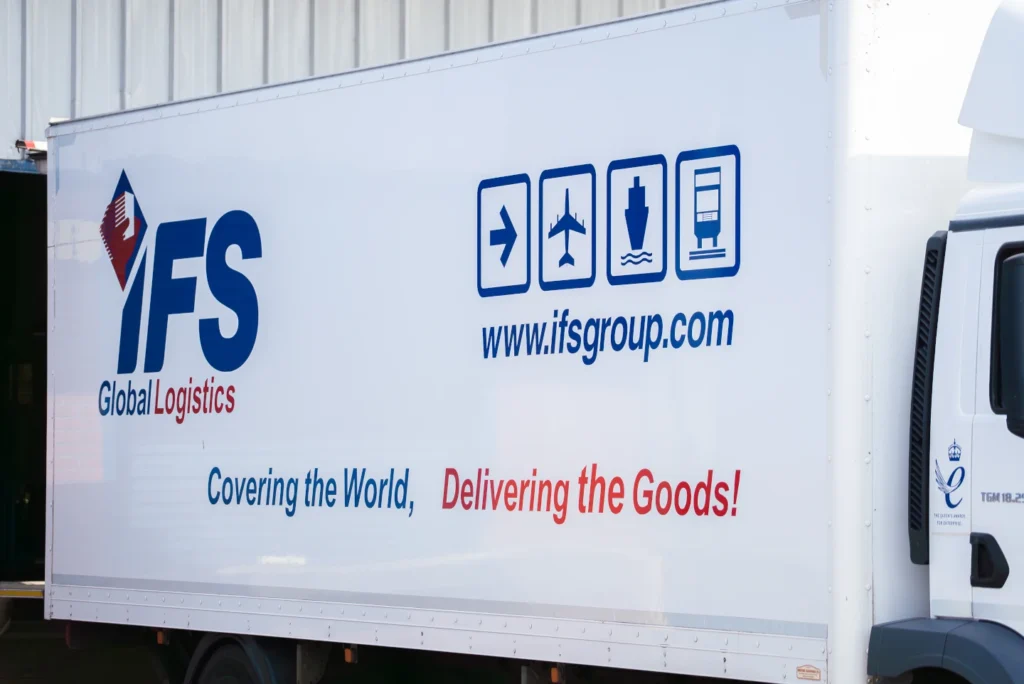Global supply chains have become a complex web of suppliers, carriers, ports, warehouses and regulatory agencies. Each shipment can cross multiple borders and transportation modes before it reaches the buyer’s doorstep. For manufacturers and retailers, the difference between a smooth delivery and an expensive delay often comes down to the expertise of the freight forwarder.

What is a Freight Forwarder?
A freight forwarder is a logistics specialist who coordinates the movement of goods from origin to destination. Acting as an intermediary between shippers (the companies sending goods) and carriers (airlines, shipping lines, trucking firms, and rail operators), they arrange transport, manage customs clearance, prepare documentation, and provide cargo insurance. They do not typically own transport assets but instead use their global networks to deliver seamless logistics solutions.
A prime example of a freight forwarder is IFS Global Logistics, operating out of Northern Ireland with hubs in Antrim and Carrickfergus. Since 1967, IFS has provided comprehensive freight forwarding services alongside customs brokerage, warehousing, and transport solutions. Unlike many forwarders, IFS also owns and operates its own transport assets, including lorries and courier vans, giving customers the added assurance of end-to-end control, reliability, and service precision.
Key Responsibilities in Global Supply Chains
1. Coordinating Multimodal Transport
Freight forwarders plan shipments across road, sea, and air, selecting the most suitable option for each delivery. While some shipments demand speed or cost efficiency, others are arranged with a focus on reliability, convenience, or specific customer requirements.
2. Navigating Customs and Compliance
International trade is governed by a complex system of tariffs, licences, and security requirements. Freight forwarders play a key role in ensuring that critical documents, such as commercial invoices, packing lists, bills of lading, and certificates of origin, are accurate and compliant with local laws. This helps minimise the risk of fines or delays at customs. However, compliance is not solely the responsibility of the forwarder; shippers and receivers also have obligations to provide accurate and complete information to support the process.
3. Managing Risk and Cargo Insurance
Freight forwarders support businesses in reducing the risks of loss or damage during transit. While customers often arrange their own cargo insurance, forwarders can assist with insurance options depending on the service and agreements in place. In addition, forwarders provide proactive shipment tracking and oversight to help identify and address issues quickly, giving customers greater peace of mind.
4. Improving Efficiency
By consolidating shipments from multiple clients, freight forwarders can negotiate competitive rates and reduce unnecessary handling. They also analyse transport routes and logistics processes to streamline operations, helping businesses move goods more smoothly and reliably.
5. Providing Tracking and Visibility
Modern freight forwarders use advanced technology to provide real-time shipment tracking and predictive insights, helping clients anticipate delays and optimise supply chains.
Why Freight Forwarders Like IFS Are Essential

- Global Reach with Local Expertise:
IFS Global Logistics combines decades of local experience in Northern Ireland with an extensive global network. - Full-Service Scalability:
From pick-up to delivery, including customs brokerage, warehousing, and multimodal transport, IFS offers complete end-to-end solutions. - Compliance and Certification:
With accreditations such as ISO 9001, AEO, IATA, BIFA, and UKWA, IFS demonstrates its dedication to quality, security, and compliance. - Tailored Solutions and Trust:
IFS provides flexible, client-focused services and builds long-term partnerships based on reliability and innovation.
Technology Meets Human Expertise
Freight forwarding is rapidly evolving with the adoption of digital tools. Platforms now enable real-time visibilit and faster customs clearance. IFS leverages technology such as automated processes, real-time tracking, and advanced data analysis to improve accuracy and efficiency.
Despite this digital transformation, human expertise remains vital. Experienced freight forwarders interpret complex data, resolve unexpected issues, and navigate cultural and political challenges that technology alone cannot manage.
Industry Challenges for Freight Forwarders
Freight forwarders operate in an increasingly demanding environment. Some of the main challenges include:
- Economic Volatility: Fluctuations in global markets, currency exchange rates, and economic growth directly affect shipping volumes and profitability.
- Regulatory Complexity: International trade rules are constantly changing, with new customs procedures, sanctions, and environmental regulations requiring continuous monitoring and adaptation.
- Capacity Constraints: Global events, such as container shortages, port congestion, or geopolitical tensions, can restrict transport availability. Forwarders must leverage strong networks to secure space and keep goods moving.
- Rising Customer Expectations: Businesses now demand faster delivery times, greater transparency, and sustainability initiatives. Meeting these expectations requires both investment in technology and operational flexibility.
Forwarders like IFS address these challenges by combining advanced digital tools with decades of practical experience, ensuring they can adapt quickly, maintain service quality, and deliver value even in unpredictable market conditions.
Choosing the Right Freight Forwarder
When selecting a freight forwarder, businesses should look for:
- Proven experience in relevant industries and markets
- A robust and trusted global partner network
- Advanced technology for tracking and documentation
- A commitment to compliance, security, and sustainability
A skilled freight forwarder is not simply a service provider but a strategic partner, ensuring goods move efficiently and safely around the world.
For organisations seeking to navigate this landscape, partnering with an experienced freight forwarder is not a luxury but a necessity. These specialists orchestrate the movement of goods and use technology to keep supply chains visible and responsive. In a world where disruption is constant, a trusted forwarder can mean the difference between hitting a delivery window and missing a market opportunity.
Frequently Asked Questions (FAQs)
What does a freight forwarder do?
A freight forwarder coordinates the movement of goods through the supply chain, which may include arranging transport, handling documentation, managing customs clearance, and overseeing delivery. However, the exact responsibilities depend on the Incoterms used in the trade agreement, as these determine which party, the buyer or the seller, is responsible for specific stages of the shipping process.
Which documents are needed for international shipping?
Common documents include commercial invoices, packing lists, bills of lading, certificates of origin, and permits where required.
How does technology improve freight forwarding?
Digital platforms provide real-time tracking.